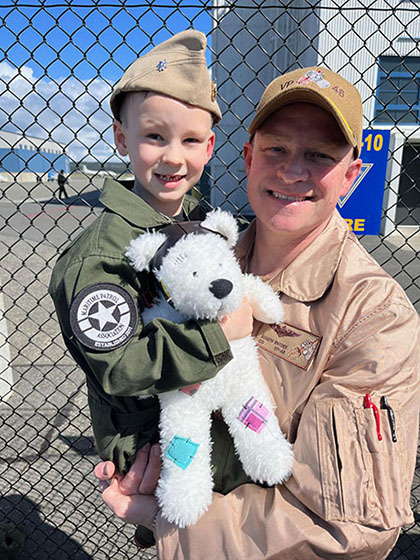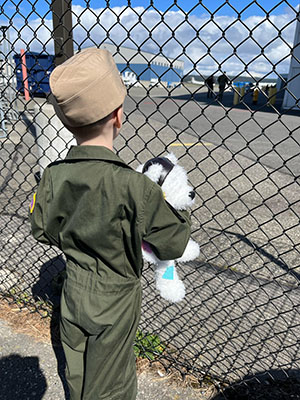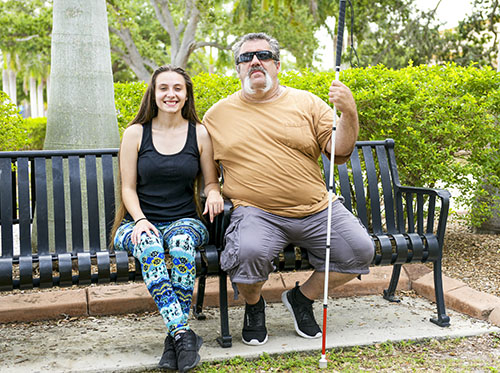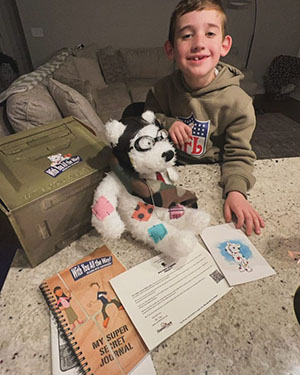Strategies to Help Prepare Kids for Military Deployment

Imagine the difficulty of being away from your family for months – or longer – at a time.
For military families, that’s a common occurrence with deployment. Preparing children for that situation can be confusing, even scary. How do you tell them mom or dad will be gone for so long and why they’re leaving without causing them to worry?
It's essential to approach the conversation of deployment with sensitivity to help children understand, cope, and adjust to the changes in their family dynamics.
6 Tips for Helping Military Kids Facing Deployment
Trevor Romain is a professional speaker, author, and co-founder of Comfort Crew for Military Kids, a community partner of Wounded Warrior Project® (WWP) since 2018. Comfort Crew delivers proven resources to help military kids and their families connect and build resiliency in the face of challenges.
Trevor has traveled the globe talking to schoolchildren about various subjects, including deployment. He educates and empowers kids to handle adversity and shows parents what they can do to make the process easier.
1. Be honest but age-appropriate
Honesty is key, but tailoring the conversation to the child's age and maturity level is important. Younger children may need simple explanations, while older children can handle more details, like the location or duration of the deployment.
Allow the child to ask questions, and if a child asks a direct question, tell the truth.
“Give children permission to ask questions about what is worrying them,” Trevor said.
The child’s age may affect the way you answer, but being honest with the answer is paramount.
“I think we can tell the truth in a comfortable way,” Trevor said. “As opposed to saying you're going to war, maybe say you’re going to help people in another country have peace.”

2. Express feelings
Encourage your child to express their feelings about the deployment and share your feelings as well. It's OK to admit that you'll miss each other and feeling sad, scared, or angry is normal. This open expression of emotions can strengthen your bond and provide comfort.
“It’s important to hear what the child is saying and then validate those feelings and help them to maybe come up with a solution themselves,” Trevor said.
3. Empower children to provide comfort
Trevor recalled a young girl whose dad was deployed, and she could often hear her mom crying alone in the bedroom. They didn’t talk about what was happening. The mom didn’t want to worry the child or depend on the child to make her feel better, but the child was aware her mom was sad and didn’t know what to do about it. Trevor said it’s important to sit down with the child and allow them to be part of the conversation and the solution.
“Giving the child permission to comfort their family and comfort someone else is a very empowering way of helping them deal with their own feelings,” Trevor said.
4. Offer reassurance
Children might worry about their parent's safety or feel anxious about changes at home. Reassure them that their deployed parent is doing important work and that measures are in place to keep them safe. Also, emphasize the support systems available to the family, such as other family members, friends, and military support networks.
Trevor suggests telling kids about how the military operates, too. Letting them know how well-trained military service members are and that you have a team of people who work with you and protect you can give kids a lot of comfort.
“You can tell them you have a great team to work with you and protect you, and you are all trained together to look after each other,” he said. “Often that is a very satisfying answer to children because in their minds it's, it's almost like facing a monster in the closet at night by yourself, it's this big enemy, but when you have someone else with you, the threat becomes smaller.”
5. Create deployment rituals
Establishing special rituals before, during, and after the deployment can help children cope. This might include:
- Creating a countdown calendar.
- Having a special meal before departure.
- Starting a project they can work on until the parent returns.
“Having a particular celebration before someone is deployed and creating a specific ritual or event to be able to emphasize what we are feeling can be really helpful,” Trevor said.
6. Seek support
Don't hesitate to seek support from the community, veterans service organizations, counselors, or schools. These resources can offer additional guidance on talking to kids about deployment and provide support systems for parents and children.
“There are still a lot of deployments going on, and, from a child's perspective, they're still separated from that family member,” said Angela Salyer, executive director of Comfort Crew. “When that family member returns home, things have changed. Roles have changed. There's still that challenge of learning to live together again after a time of separation, so it's so important that we are providing them with the skills that they need to be able to understand what's going on and manage those feelings and know how to ask for help when they need it.”
How a Warrior Navigated the Conversation of Deployment
Army veteran Aaron Cornelius is the father of five daughters, the youngest born in 2001. He’s had the deployment conversation more than once.

Aaron was first deployed to Iraq in 2003 in the wake of the 9/11 attacks. He said that conversation with his family was probably the most difficult, primarily because no one knew what to expect.
“Not knowing what's transpiring and how things work and how things are going to work, and everything’s just completely up in the air, it was hard to prepare and know what to tell them,” Aaron said.
However, Aaron’s late wife did all the right things to keep the kids and their dad connected. She put up a poster-size photo of Aaron over the bed so the kids could tell him goodnight and good morning every day. They wrote letters to him and would send goodies, including his favorite candy from the 25-cent gumball machine.
“My wonderful wife at the time just tried to keep their spirits up, especially the little ones,” Aaron said. “She would make something pleasant of it to keep up that connection and keep them hopeful and happy rather than dread and worry about what could happen.”
Preparing ahead of time is helpful to ensure things go as smoothly as possible. Keeping the lines of communication open is important, too.
“Because maybe they want to tell you some loving things before you go,” Aaron said. “Or maybe they just have questions they’ve been pondering that they want to know, and you don’t want them stressing and wondering about that stuff.”
During Aaron’s deployments, he clung to the thoughts of his family and was motivated by them.
“When you're away like that and doing what you're doing, [thinking about] your family back home gives you lots of strength, too,” Aaron said. “Even though it can be sad, it also kind of keeps you together.”
Aaron had his last deployment discussion with his family before his third tour in Iraq in 2008. It was during that deployment that the vehicle Aaron was in blew up, and the shrapnel tore a hole in his skull, leaving him completely blind.
After that life-changing deployment, Aaron and his family had to figure out a new normal. WWP™ connected Aaron to programs and services that helped him and his family adjust to their new dynamic.
Providing Comfort to Military Kids

With support from WWP, Comfort Crew provides “comfort kits” to kids who face deployment, reintegration, injury, and loss. The kits, primarily designed for ages 6-12, help give children and their parents tools and resources to manage the challenges and transitions associated with being a military family.
“Kids needed materials that were in a kid-friendly language that they could understand,” Angela said. “The thought going into the kits is to develop resources that help them understand, manage, and express their feelings. Another component is to let them know that they're not alone.”
The kits contain a journal, a map, a calendar, chore charts, and a family guidebook that gives parents tips to talk to their kids and to know what to expect at different ages. It also has postcards the parent and child can send to each other and matching dog tags that the kid and parent can each wear.
The other advantage of the kits and Comfort Crew’s resources is that kids can use the lessons throughout their lives.
“They're very transferable,” Angela said. “There may be a lot of challenges in their lives, so if they can learn how to express their feelings and communicate what's going on and ask for help, all of those things are going to be able to help them with whatever challenges they're facing.”
Keeping Military Families Connected
Comfort Crew also offers a free Comfort Crew Academy that allows kids to access videos, PDF files, and take courses to help build resiliency, manage stress, and more.
“With the help of Wounded Warrior Project over the past couple of years, [Comfort Crew Academy] has been a wonderful way for us to expand and enhance the comfort kit resources,” Angela said.
By fostering open communication, involving children in the process, and utilizing available support networks, military families can navigate the challenges of deployment and maintain strong, supportive relationships with their children. It’s also important to recognize how children of service members are often serving, too.
“A lot of times, it's just as simple as them knowing that people appreciate and recognize the sacrifices that they're making,” Angela said. “Military kids didn't raise their hand and sign up, but they're still making a lot of sacrifices.”
Wounded Warrior Project empowers leading military and veterans organizations to reduce suicide risks and build strong families. Since 2012, WWP has invested more than $343 million in 212 organizations that help wounded veterans and families across the country. Together, we improve the quality of life for veterans, families, and caregivers to strengthen communities.
Contact: — Paris Moulden, Public Relations, pmoulden@woundedwarriorproject.org, 904.570.7910
About Wounded Warrior Project
Since 2003, Wounded Warrior Project® (WWP) has been meeting the growing needs of warriors, their families, and caregivers — helping them achieve their highest ambition. Learn more.